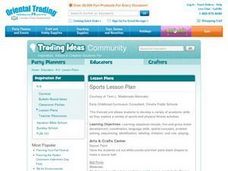Texas Center for Learning Disabilities
Fourth-Grade Text-Based Intervention
Provide young readers with the extra support they need using this series of 10 literacy lessons. Following a repeated sequence of learning activities, these lessons engage children in expanding their vocabulary and developing their...
Santa Monica-Malibu Unified School District
Parts of Speech Pronouns: Building Blocks of Grammar
Pronouns are the most helpful parts of speech! Model the ways that interrogative, indefinite, personal, and demonstrative pronouns can specify meaning and enhance writing with a hands-on activity.
LABScI
Taxonomy: Who is in My family?
Find similarities in seemingly unlike organisms. The second instructional activity in a series of 12 builds the concept of a taxonomy and explores the use of a dichotomous key. Learners begin in part one by attempting to group a set of...
American Statistical Association
Chunk it!
Chunking information helps you remember that information longer. A hands-on activity tests this theory by having learners collect and analyze their own data. Following their conclusions, they conduct randomization simulations to test...
Facing History and Ourselves
Us and Them: Confronting Labels and Lies
Stereotyping and discrimination based on religion catalyze many atrocities in the world. Explain the awful treatment of Jews and the lies Nazis spread by using an informative yet sensitive resource. Learners participate in a warm-up and...
National Institute of Open Schooling
Periodic Table and Atomic Properties
An in-depth lesson, the fourth activity in a series of 36, begins with teaching how the periodic table's arrangement came to its current design. Using this knowledge, pupils then move on to analyze the arrangement of elements to their...
Montana State University
Everest Extremes: Biodiversity
How many animals can live in a climate as cold as Mount Everest's? Find out with a science instructional activity all about biodiversity. Activities include research, presentations, group work, coloring maps, and a simulation of a food web.
August House
How Tiger Got His Stripes
How did the tiger get its stripes? Kindergartners read a Vietnamese folk tale, "How the Tiger Got His Stripes," retold by Rob Cleveland, and work through several reading comprehension and literary analysis activities.
Illustrative Mathematics
Christina's Candies
Help Christina figure out how many chocolate and lemon candies she has with a lesson on decomposing numbers. When presenting this context to the class, the teacher chooses the total number of candies and the number that are chocolate,...
Film English
Serial Taxi
Explore the murder mystery genre through film, discussion, and writing. The plan features several activities centered around a two-minute video that include collaboration, writing, and prediction. After the lesson, individuals write...
Colorado Unit Writing Project
Fun with Phonemic Awareness
The phonemic awareness activities in this packet are designed to help kids develop skills in rhyming, syllabication, blending onsets and rimes, and beginning and ending sounds. Well worth a place in your curriculum library.
Code.org
The Need for Algorithms
Pairs work through two scenarios that require them to generate an algorithm. The first activity requires pairs to define a common language to use; the second comes with the language. The pairs then must determine how to code the...
Virginia Department of Education
Thermochemistry: Heat and Chemical Changes
What makes particles attract? Here, learners engage in multiple activities that fully describe colligative properties and allow the ability to critically assess the importance of these properties in daily life. Young chemists conduct...
Curated OER
Genome: The Secret of How Life Works
What do you have in common with a fruit fly? About 60 percent of your DNA. The resource, divided into two units, is intended for grades four to eight and another for high schoolers. Both units include eight lessons covering the genome as...
Curated OER
Folk Tales for ESL Students
Using the folk tale "The Man, The Boy, and The Donkey" (linked in the lesson) and a SMART board, teachers can help pupils access multiple skills. Reading the story allows learners to create a timeline of the sequence of events based on...
Curated OER
Pancakes, Pancakes (Elementary, Science)
Read Pancakes for Breakfast by Tomi De Paola then participate in different activities which practice skills such as English language development, using non-standard measurement, fine motor skills, dramatic play, and using our five senses.
Teach Engineering
Discovering Phi: The Golden Ratio
Fe, phi, fo, fum. This activity leads pairs to find the ratio of consecutive terms of the Fibonacci sequence. The pairs find that the Fibonacci sequence can be found in many places. A discussion with the class shows that the ratios found...
Curated OER
Number Line Up
A simple counting activity to help your kindergartners count in sequence. Hand out number cards randomly (one to represent each child in your class) to each class member. Now ask the class to put themselves in sequential order beginning...
Curated OER
Stem Cell Differentiation Game Questions
Thirty-five multiple-choice questions are spread out into boxes bordered with dotted lines so that they can be cut out to become game cards. Playing a game to review concepts is an effective way to learn, even if you are in college. Give...
Curated OER
Making Cranberry Bread
While the preparation for this lesson is extensive, the results are well worth the effort. Prior to the lesson, Xerox the pictures from Cranberry Thanksgiving by Wende and Harry Devlin, collect the ingredients for Cranberry Bread, and...
Curated OER
Lady Bug Connect the Dots
In this Ladybug Girl instructional activity, students connect the dots, sequence plant growth, circle things to eat, and more. Students complete 6 activities.
Curated OER
Cards For Fractions
As a critical-thinking activity, this series of problems would be a great supplemental activity to use after a unit on fractions. The solutions require a good deal of thought and allow learners to tap into their problem solving abilities.
Curated OER
Jack-O-Latern Lesson
Have a Happy Halloween and build strong oral language skills. Special needs Pupils functioning at a moderate level can practice sequencing, writing lists, and using oral language by explaining how they carve a pumpkin.
Curated OER
Sports Lesson Plan
Have your class participate in a variety of sports and craft activities using this resource. With sports as the theme, learners work on art projects. Pupils create soccer ball prints, a three dimensional football, and a sports collage.
Other popular searches
- Story Sequencing Activities
- Free Sequencing Activities
- Pizza Sequencing Activities
- Math Sequencing Activities
- Sequencing Activities 3rd
- Sequencing Activities Apples
- Money Sequencing Activities
- English Sequencing Activities
- Recipe Sequencing Activities
- Reading Sequencing Activities

























